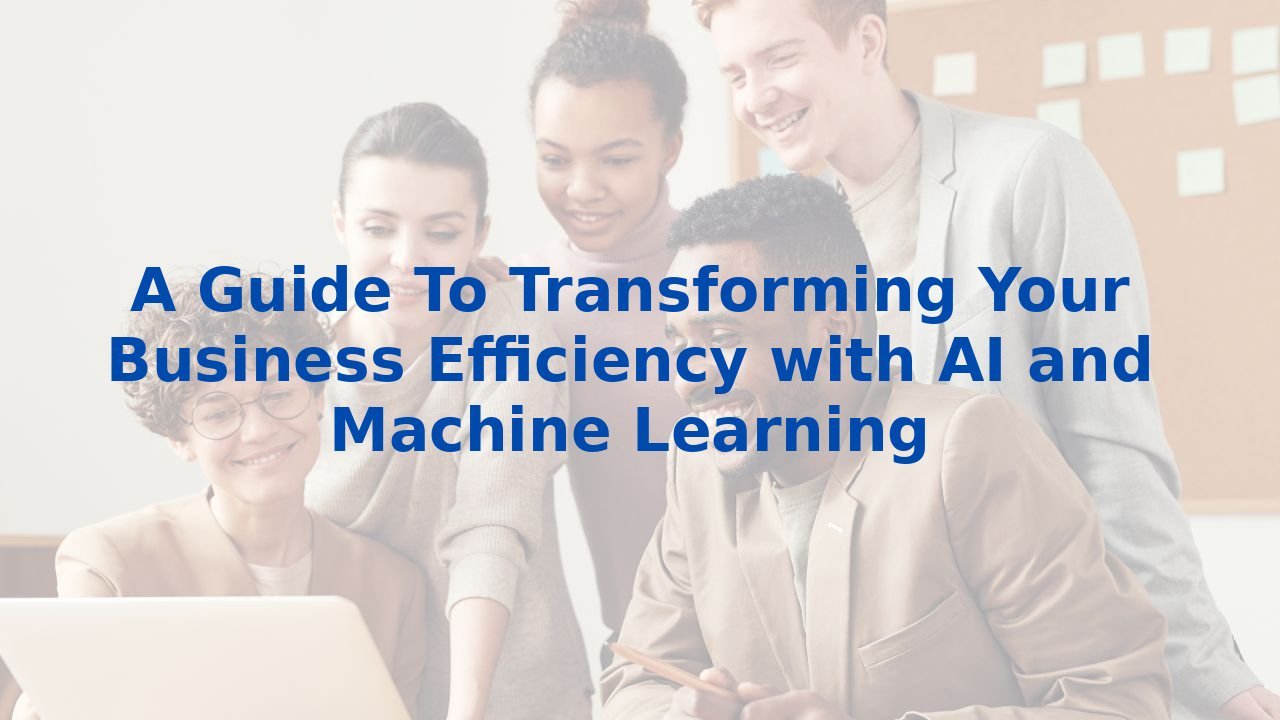A Guide To Transforming Your Business Efficiency with AI and Machine Learning
Embracing the Future of Business: How AI Enhances Efficiency
Introduction
In today’s fast-paced business environment, organizations strive to not only keep up with competition but to also enhance their operational efficiency. The integration of Artificial Intelligence (AI) and Machine Learning (ML) has emerged as a game-changer, offering vast potential to revolutionize traditional business processes. This guide will elucidate how AI can enhance these processes, highlighting the remarkable benefits it brings for improving efficiency within an organization.
What is AI and ML?
AI and ML may have been around for a while, but their implementation has significantly evolved, offering organizations unprecedented opportunities. These technologies allow firms to scale operations, bolster employee performance, and unearth insights from the vast seas of data they collect. By leveraging the power of AI and ML, businesses can validate and challenge foundational assumptions, leading to more informed decision-making.
Enhancing Business Processes with AI
1. Data Analysis
AI tremendously improves efficient data handling through:
- Automation: Repetitive tasks like data entry can be automated with AI, freeing up employees to focus their efforts where they count the most. AI's ability to analyze massive datasets quickly means it can reveal patterns and trends that may escape human analysts.
- Insight Generation: Applying ML algorithms can generate actionable insights vital for decision-making in sectors like finance, healthcare, and retail, where data-driven strategies are key to success.
2. Customer Service
Another application where AI excels is customer service:
- Personalization: AI-driven chatbots and virtual assistants provide personalized experiences, enabling customers to retrieve information swiftly. This personalization fosters higher satisfaction rates and solidifies brand loyalty.
- Efficient Support: By automating responses to common queries, AI allows human support agents to devote their time and expertise to tackling intricate customer issues.
3. Employee Empowerment
AI actively contributes to employee productivity by:
- Task Assistance: AI tools can empower employees by assisting in their daily tasks, streamlining research and documentation, and enabling them to discover relevant information faster.
- Skill Development: Incorporating AI into training programs allows employees to cultivate new skills, equipping them to navigate changes in job demands while enhancing their overall productivity.
4. Code Creation and Data Analysis
AI is revolutionizing operations even in technical fields:
- Code Smarter, Not Harder: Generative AI helps developers expedite coding, allowing them to allocate their time and energy toward more complex and creative tasks.
- Data-Driven Decisions: With its capacity for analyzing complex datasets, AI provides insights essential for informed business decisions, particularly in finance and healthcare, where data accuracy is critical.
5. Cybersecurity
Cybersecurity is another vital domain where AI shines:
- Predictive Analytics: AI's prowess in predictive analytics can identify potential security threats beforehand, diminishing the likelihood of cyberattacks and enhancing the overall security framework of the organization.
- Incident Response: In the face of a cyber crisis, AI can swiftly analyze situations and contribute to mitigation strategies, facilitating a more streamlined recovery process.
Benefits of Training Employees for AI
While embracing AI can vastly enhance business processes, empowering employees through training is equally vital. Here’s why:
- Adaptability: Employees equipped with AI training adapt more readily to new technologies, streamlining transitions to AI-based systems.
- Efficiency: Knowledgeable employees wield AI tools effectively, enabling them to automate tasks and direct their focus on more high-value activities.
- Innovation: Trained employees are more likely to spot opportunities for AI applications, becoming catalysts for innovation in their organizations.
- Trust and Confidence: A deep understanding of AI’s capabilities cultivates a culture of trust, leading to optimal use of these technologies.
Conclusion
The synergy of AI and ML with business processes is ushering in a new age of operational efficiency. By automating routine tasks, generating actionable insights, and refining customer service, AI is vital for transforming organizations. Furthermore, investing in employee training ensures that these technologies are leveraged to their fullest potential, unlocking pathways to innovation and adaptability. In an ever-evolving landscape, embracing AI and ML stands as a cornerstone for maintaining a competitive edge.
If you're interested in empowering your workforce with AI skills, consider exploring comprehensive training programs tailored for entire organizations.
For more insights into AI integration and training, visit the AI Learning Blog or explore various AI Training programs available.



